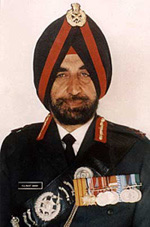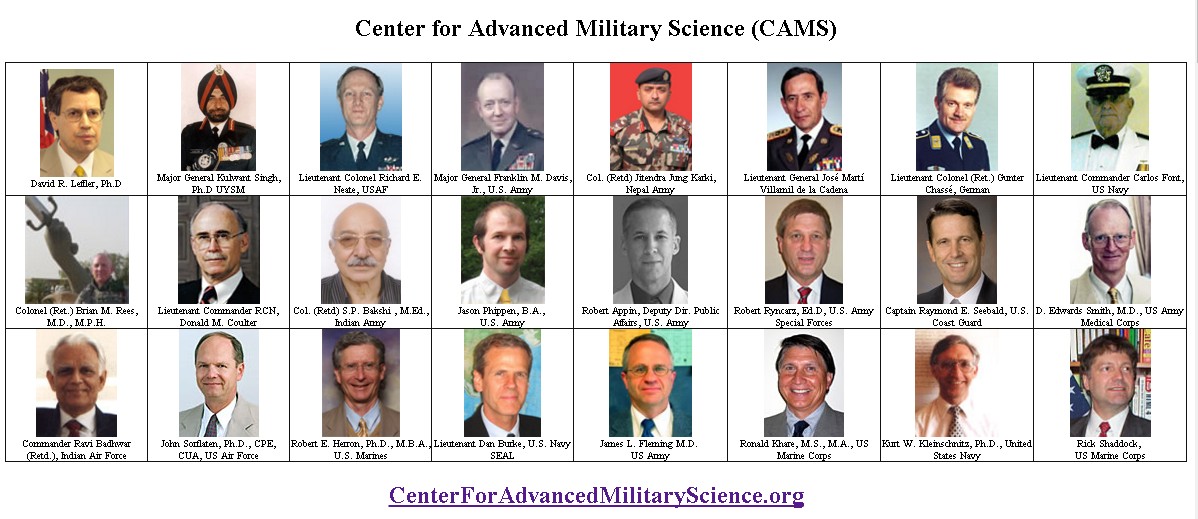
David R. Leffler, Ph.D |

Major General Kulwant Singh, Ph.D UYSM |

Lieutenant Colonel Richard E. Neate, USAF |

Major General Franklin M. Davis, Jr., U.S. Army |

Col. (Retd) Jitendra Jung Karki, Nepal Army |

Lieutenant General JosÚ MartÝ Villamil de la Cadena |

Lieutenant Colonel (Ret.) Gunter ChassÚ, German |

Lieutenant Commander Carlos Font, US Navy |

Colonel (Ret.) Brian M. Rees, M.D., M.P.H. |

Lieutenant Commander RCN, Donald M. Coulter |

Col. (Retd) S.P. Bakshi , M.Ed., Indian Army |

Jason Phippen, B.A.,
U.S. Army |

Robert Appin, Deputy Dir. Public Affairs, U.S. Army |

Robert Ryncarz, Ed.D, U.S. Army Special Forces |

Captain Raymond E. Seebald, U.S. Coast Guard |

D. Edwards Smith, M.D., US Army Medical Corps |

Commander Ravi Badhwar (Retd.), Indian Air Force |

John Sorflaten, Ph.D., CPE, CUA, US Air Force |

Robert E. Herron, Ph.D., M.B.A., U.S. Marines |

Lieutenant Dan Burke, U.S. Navy SEAL |

James L. Fleming M.D.
US Army |

Ronald Khare, M.S., M.A., US Marine Corps |

Kurt W. Kleinschnitz, Ph.D., United States Navy |

Rick Shaddock,
US Marine Corps |
'In truth then victory is really this; for the one who has no risk of inner
defeat. In truth, by the suppression
only of outer (usual) enemies no one can become permanently victorious; because
from those enemies there is no lasting suppression. True knowledge of victory
occurs then from obtaining control over internal enemies. Really, only by the
permanent subjugation of internal enemies is the subjugation of the external
enemy achieved; because the inner enemy gives rise to the creation of the
external enemies.
The internal enemies are kaama (lust), krodha
(anger), lobha (greed), moha (delusion), mada (intoxification) and maatsarya
(jealousy). This is really the shhaDarivarga, the group of six inner enemies
which create any external enemies of the world; therefore if you wish to
experience happiness and peace one must gain victory over all one's gross
enemies, then you should cut off the place of birth of the six subtle enemies,
kaama (lust), krodha (anger), lobha (greed), moha (delusion), mada (intoxification)
and maatsarya (jealousy). Without gaining victory over the shhaDarivarga
(group of six enemies) then you cannot completely irradicate the external
enemies. This is fixed.
This is the proven experience of those who have
gained victory over these internal subtle enemies, that if the birthplace of
the external enemies becomes destroyed and all enemies have become eradicated
then afterwards no enemies remain and in truth this is considered to be a real
victory. For him the true and lasting store-house of happiness and peace is
opened.
To be completely free from enemies, that country
should be wholely settled in happiness and peace, and for that it is required
that the creator of that region or the leader has gained victory over the
aantarika shhaDarivarga (the group of six inner enemies), otherwise this is
what really occurs that; 'of one's own accord one's life is destroyed' and 'of
one's own accord one is choked'. The past history of many hundreds of years is
a witness to this statement, that the chief leaders of the new countries did,
by their own inner kaama (lust), krodha (anger), lobha (greed), moha
(delusion), etc, instigate the colouring of the earth blood red, many times.
This is brutish. On whom the burden of running a kingdom befalls, he should
acquire the special charactaristic of powerful insight. To have trust in a
gust of agitation of the emotions, of kaama (lust), krodha (anger), lobha
(greed), moha (delusion), etc, is not a great wish or humane to the whole
world.
Up to what extent can we suppress our outer
enemies? We subdue one but are intimidated by another, this then is the
suppression of an enemy but there is no sign of triumph. Whilst victory over
the internal enemies is not obtained then this will remain the condition.
Therefore, this much is necessary, that the leader of a country obtains
triumph over his own inner aantarika shhaDarivarga (group of six inner
enemies). Thus if the leader of society is really victorious, then they can
successfully demonstrate the path of lasting happiness and peace for the
country and the whole world.
It is not very difficult to obtain triumph over
kaama (lust), krodha (anger) etc. But without understanding, people are
habituated to presuming it is out of their reach. Mostly people have become
resolved that only a mahaatmaa (a great soul) on the nivR^itti maargii (the
path of renunciation) can attain triumph over the shhaDarivarga (six enemies);
but this determination is really based in ignorance. The basis of the nivR^itti
maargii (path of renunciation) then is giving up and severing all connections
with the root cause of kaama (lust), krodha (anger) etc. So for him there is
no question arising of victory or defeating anybody. It is assumed that a
victor over the shhaDarivarga then is he who can engage continually in
vyavahaara (daily business, employment etc.); but that on him desire and anger
cannot accumulate and gain monopoly. So the enemy can constantly have the
opportunity to make an attack; but that power to attack will not be strong
enough; for this reason then he (the enemy) will surrender, as he is flawed
and defeated. The continuous flow of daily business is no trouble in getting
victory over shhaDarivarga (the six enemies).
The birthplace of all enemies of saMsaara (mundane
existence) is the collecton of subtle enemies. The willingness for obtaining a
victory by awakening physical preparation for battle and making the period of
disquiet of life and death, is not necessary. For this only it is only
necessary to become dispassionate and act with stong discernment.
One who is a samadarshii (one who is impartial,
dispassionate) is one who is said to see very well - he who sees a thing for
what it really is is said to be samadarshii. In the real form of a thing and
in seeing it he makes no distinction, he is in a complete inner stae of
harmony and remains fit. In his vision the perception of a thing is correct,
that is to say there is no confusion. If saMsaara (mundane existence) is
delusory then there is no change in the truth of that; and if the absolute is
truth then he really accepts the truth. The falsehood of saMsaara (transitory
existence) and the permanence of the aatmaa (soul) - when a man becomes strong
then he becomes samadarshii (impartial, dispassionate). And, then he sees all
things in their real form.
The meaning of the falsehood of saMsaara is this,
that the nature is to change, become reversed, and to perish in an instant. No
more learning is necessary for anybody to understand this - all are
experiencing this, that everything in saMsaara is transient, has a tragic end
- subtlest of the subtlest and grossest of the gross things are changed. This
is apparent to every individual life that in front of us. How many individuals
are born? How many are being destroyed? All this speech is not original and
one day I also will no longer remain. If saMsaara is broken in an instant then
it is not necessary to make a great effort to undestand this. Man is
experiencing this day and night; but then again he is not considering it.
He who has once given careful thought to the
perishability of saMsaara, in his own heart, he gains victory of the aantarika
shhaDarivarga (the group of six internal enemies); because to that man, all
the material world is instantly destructible, so that he cannot have lobha
(greed) or moha (delusion) for anything; because he knows that what he has
lobha (greed) and moha (delusion) for today, tomorrow is automatically
changed; therefore lobha (greed) and moha (delusion) are to no purpose, in
effect they are really connected to remorse and anxiety; therefore lobha
(greed) and moha (delusion) are not to be grown in the inner self. The very
seeds of these become destroyed and if there are no seeds of lobha (greed) and
moha (delusion) then maatsarya (jealousy) also becomes destroyed. He is also
without matsara (wrath). No jealousy of worldly glory and wealth remain, no
arrogance or jealousy, then in him anger becomes perfectly destroyed. Thus
man's narrow wishes become attached to those of God's, and with dutiful mind
all business is accomplished. His behaviour is very naturally disciplined and
in his worldly life he is like a lotus leaf, detached and pure. Thus by such
dispassionate natural activity man is really triumphant over the shhaDarivarga
(the six enemies) - In this way there are no outer enemies of man - he governs
over all of nature alike - moreover, none becomes capable of destroying the
reign of peace. So really the samadarshii (the impartial, dispassionate one)
is the great conqueror, he can remain exhibiting the fruit of happiness and
peace.
Let that be! Triumph over the aantarika
shhaDarivarga (group of six internal enemies), that is the best and true
victory, and for this great victory man should incline his efforts.'






























